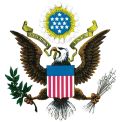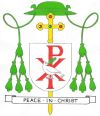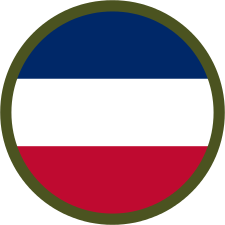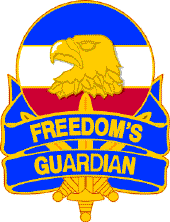US Army Forces Command (FORSCOM): Difference between revisions
Knorrepoes (talk | contribs) m (removed Category:Swords using HotCat) |
Knorrepoes (talk | contribs) m (Text replacement - "{{media}}↵" to "") Tags: Mobile edit Mobile web edit |
||
| Line 21: | Line 21: | ||
Distinctive Unit Insignia: The disc horizontally divided blue, white, and red is suggested by the shoulder sleeve insignia. The eagle, which is a symbol of freedom, refers to part of the Command's motto and is also the National emblem. The sword, a symbol of protection and guardianship, alludes to the motto, and depicted unsheathed with point up denotes readiness for combat. The three swords signify the three components of the Army: Active Army, Army Reserve and Army National Guard. The insignia was approved effective 1 July 1973. | Distinctive Unit Insignia: The disc horizontally divided blue, white, and red is suggested by the shoulder sleeve insignia. The eagle, which is a symbol of freedom, refers to part of the Command's motto and is also the National emblem. The sword, a symbol of protection and guardianship, alludes to the motto, and depicted unsheathed with point up denotes readiness for combat. The three swords signify the three components of the Army: Active Army, Army Reserve and Army National Guard. The insignia was approved effective 1 July 1973. | ||
[[Literature]]: Images from Wikimedia Commons | [[Literature]]: Images from Wikimedia Commons | ||
Revision as of 12:35, 27 December 2022
US heraldry portal
This page is part of the US heraldry portal |
Heraldry of the World |
|
US heraldry:
|
Ecclesiastical Heraldry of the USA:
Military Heraldry: |
US ARMY FORCES COMMAND (FORSCOM)
| (Shoulder Sleeve Insignia) |
(Distinctive Unit Insignia) |
Official blazon
Shoulder Sleeve Insignia: A disc 2 1/2 inches diameter consisting of three horizontal stripes of equal width of blue, white and red, the blue uppermost. The insignia has a 1/8 Army green border.
Distinctive Unit Insignia: A gold color metal and enamel device 1 3/16 inches in height overall consisting of a disc composed of three equal horizontal stripes blue, white, and red bearing in the center a superimposed gold eagle's head above a vertical gold sword in base, point up, the blade extending below the disc in front of and between two gold swords saltirewise, points up, outside and below the disc entwined with a blue double curved scroll inscribed "FREEDOM'S" on the top and "GUARDIAN" below in gold letters, the ends of the looped scroll terminating in back of the sword points on each side of the disc.
Origin/meaning
Shoulder Sleeve Insignia: The design was selected during World War I by General Pershing for wear by all personnel assigned to General Headquarters, American Expedition Forces (AEF). The source of the design is a red, white, and blue horizontally striped distinguishing mark worn as a brassard by staff officers when moving about on duty in congested areas in the front of World War I. The shoulder sleeve insignia was originally approved by General Headquarters, AEF, on 7 February 1919; approved by the War Department for GHQ on 17 June 1922; amended to wear the blue uppermost on 19 July 1941; redesignated for Army Ground Forces on 27 March 1942; redesignated for Army Field Forces on 11 May 48; redesignated for Continental Army Command on 9 September 1955; and redesignated for US Army Forces Command effective 1 July 1973.
Distinctive Unit Insignia: The disc horizontally divided blue, white, and red is suggested by the shoulder sleeve insignia. The eagle, which is a symbol of freedom, refers to part of the Command's motto and is also the National emblem. The sword, a symbol of protection and guardianship, alludes to the motto, and depicted unsheathed with point up denotes readiness for combat. The three swords signify the three components of the Army: Active Army, Army Reserve and Army National Guard. The insignia was approved effective 1 July 1973.
Literature: Images from Wikimedia Commons






